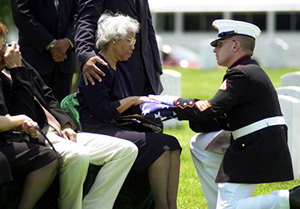 Keeping our promise to America’s veterans extends beyond the individuals who served. By caring for the families and survivors of those who honorably wore our nation’s uniform, DAV ensures they receive the necessary support they deserve and have earned.
Keeping our promise to America’s veterans extends beyond the individuals who served. By caring for the families and survivors of those who honorably wore our nation’s uniform, DAV ensures they receive the necessary support they deserve and have earned.
At a congressional hearing in January, DAV offered support for three bills that would safeguard and strengthen compensation and other benefits for survivors, such as Dependency and Indemnity Compensation (DIC) and CHAMPVA programs.
The rates for DIC have climbed minimally since its inception in 1993, and the program remains unfair compared to other federal benefits programs. For example, DIC payments to veteran survivors are 41% of a veteran’s 100% service-disabled compensation, whereas survivors of federal civil service retirees receive 55% of their loved one’s retirement funds.
“DAV believes the survivors of veterans deserve just as much consideration as the survivors of civil service employees,” DAV Assistant National Legislative Director Marquis Barefield said.
“As a result, surviving spouses have to not only deal with the heartache of losing their loved one but also contend with the loss of approximately $28,000 a year,” he added. “This particularly affects survivors who depend on that compensation as a primary source of income.”
To address this inequity, DAV has championed DIC legislation H.R. 1083, the Caring for Survivors Act. The legislation would end the VA’s arbitrary 10-year rule, which requires a veteran’s death to be service-connected or for the veteran to have been rated 100% disabled for at least a decade.
Instead, Barefield said DAV supports a new scale that begins just five years after a veteran’s initial eligibility for a 50% disability rating, bringing DIC in line with similar survivor benefits.
Another area where disabled veterans seek parity with other government programs is CHAMPVA, a health care program in which the VA shares the cost of health care for beneficiaries.
Currently, a child of an eligible veteran loses their eligibility for this important benefit at age 18 if they are not a student (otherwise, they are covered until age 23). The CHAMPVA Children’s Care Protection Act (H.R. 2414) would make children of veterans eligible for health care until age 26, the same age as the Affordable Care Act and the military’s TRICARE program.
Also, remarrying should not result in reducing or eliminating DIC payments. However, under current law, surviving spouses who remarry before 55 no longer qualify for such benefits. This injustice is underscored by the fact that, according to the VA’s annual report, only 7% of spouses receiving DIC are under the age of 56.
DAV has long prioritized removing the remarriage age for surviving spouses, which is why the organization strongly supports H.R. 3651, the Love Lives On Act.
“Survivors have been put on the back burner long enough, and they need action now,” said Barefield.
Stay informed. Join DAV CAN (Commander’s Action Network) at davcan.org to receive updates on legislation affecting veterans and their families.





